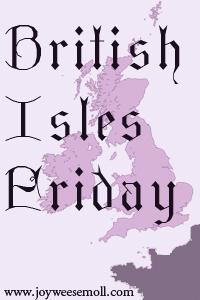 Welcome to British Isles Friday! British Isles Friday is a weekly event for sharing all things British and Irish - reviews, photos, opinions, trip reports, guides, links, resources, personal stories, interviews, and research posts. Join us each Friday to link your British and Irish themed content and to see what others have to share. The link list is at the bottom of this post. Pour a cup of tea or lift a pint and join our link party!
Welcome to British Isles Friday! British Isles Friday is a weekly event for sharing all things British and Irish - reviews, photos, opinions, trip reports, guides, links, resources, personal stories, interviews, and research posts. Join us each Friday to link your British and Irish themed content and to see what others have to share. The link list is at the bottom of this post. Pour a cup of tea or lift a pint and join our link party!
Last week, I needed a quick short post and went with an exploration of the word tickety-boo (I watched Season 4 of Luther this week - tough-guy Luther used "tickety-boo" once in a way that was clearly tongue-in-cheek). Heather reviewed Seducing the Marquess, a Regency novel with a twist. Sim's virtual wandering in London took us to where her mom grew up in Hayes, complete with charming family photos. Karen reviewed The Old Devil by Kingsley Amis - the 1986 Booker Prize winner. Jean reviewed The Shuttle, a title that I never heard of by Frances Hodgson Burnett.
After watching Olivia de Havilland in Midsummer Night's Dream and both Olivia de Havilland and Errol Flynn in Captain Blood, the next natural step was to watch The Adventures of Robin Hood with Errol Flynn as Robin Hood and Olivia de Havilland as Lady Marian.
My first exposure to Robin Hood was The Merry Adventures of Robin Hood by Howard Pyle. I associate that with Grandpa Weese, so I'm going to assume that I read the same copy that he read as a child. I have no idea where that volume ended up. The Merry Adventures of Robin Hood was originally published in 1883. I'm not sure how old I was when I read it, but pretty young because I just realized a misconception that I've had all these years.
I assumed that Robin Hood was an invention of Howard Pyle, like Scrooge is an invention of Charles Dickens and Mr. Darcy an invention of Jane Austen. Nope. Robin Hood is a legend, possibly based in history, like King Arthur. I was surprised to learn in the very thorough Wikipedia article about Robin Hood that even though he's popularly associated with the reign of Richard the Lionheart and the petty and spiteful Prince John, both the earliest forms of the legend and the history (if any) point to a later time, possibly during the reigns of King Edward I or King Edward II.
The Adventures of Robin Hood is firmly entrenched in the popular culture version. Basil Rathbone plays the dastardly Sir Guy of Gisbourne and Claude Raines is Prince John. I assume that it won't be a spoiler for anyone to learn that Richard the Lionheart makes an appearance near the end of the film. King Richard was one of the most famous roles of affable character actor, Ian Hunter. I can't remember seeing the film before, but I'm very glad to have it in my imaginings of Robin Hood now. This is a brighter and more fun version of the story than the one that featured Kevin Costner.
Released in 1938, The Adventures of Robin Hood is only three years later than Midsummer Night's Dream and Captain Blood, but the production values are a big leap into the modern age with vivid color, glorious costumes, and more realistic sets. The sound was good, too, but I can never tell if that's because of the original production or something that's been enhanced in the preservation.
What's your favorite way to enjoy the Robin Hood legend?

About Joy Weese Moll
a librarian writing about books
